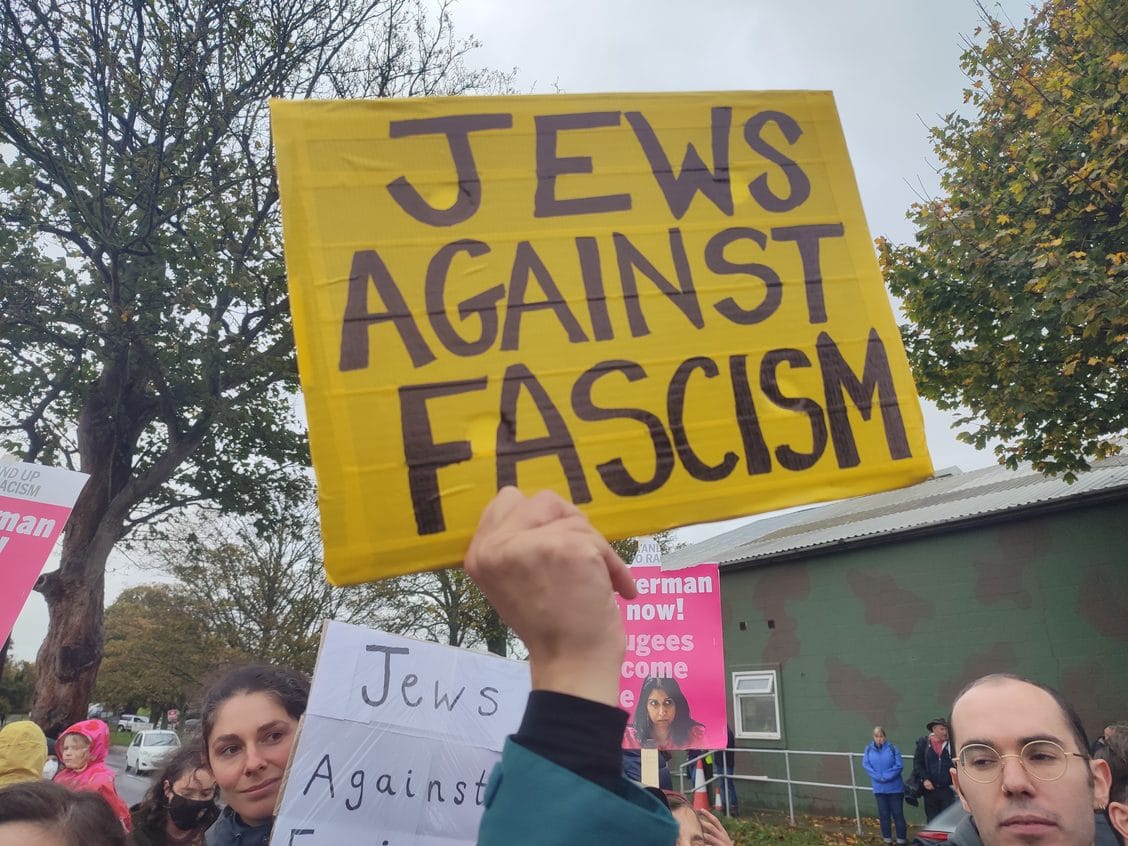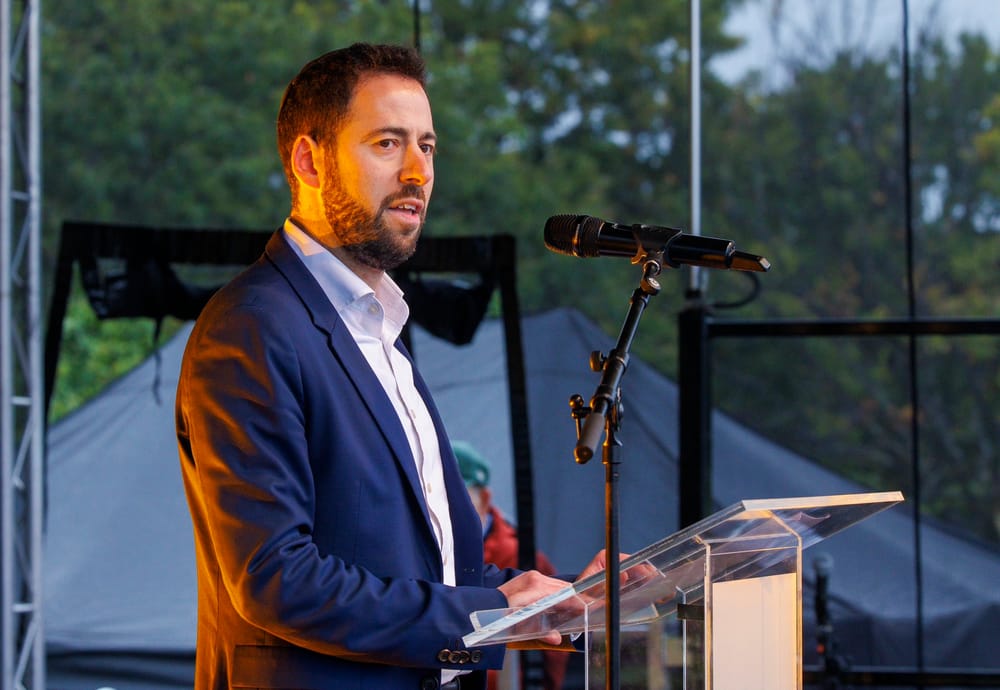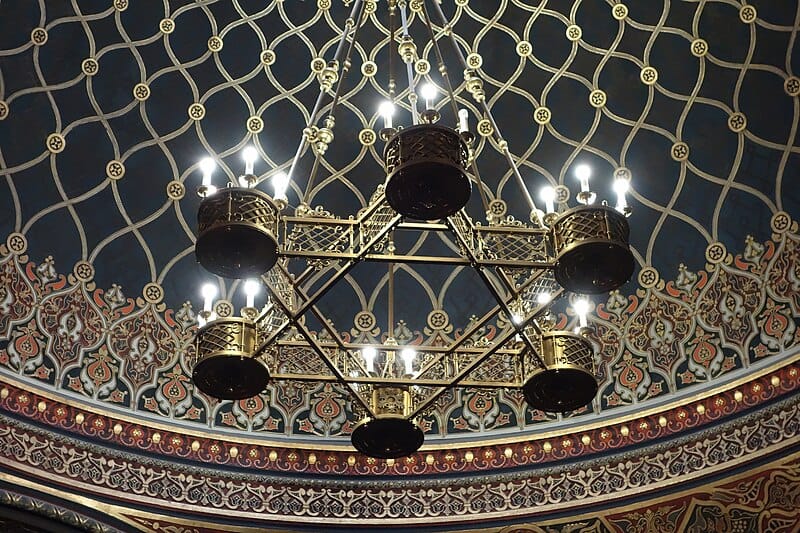Off Twitter, onto the streets
A report from the Jewish bloc at the protest to shut down Manston.

“When my family left Germany and came to Britain, and we said never again, we weren’t stuttering.”
It’s Sunday and I’m speaking to Charlie as a red sun dips beneath the horizon of the old military airfield in Manston, Kent. Now an RAF history museum, it sits directly opposite a place that is rapidly becoming a byword for Britain’s inhumane border regime – and where Charlie and around 120 others have spent the day protesting in the pouring rain.
First opened in February this year, Manston is technically not an immigration detention centre like, say, Yarl’s Wood. It’s intended as a halfway house between arrival in Britain and placement in longer-term accommodation, the idea being that people should be in and out within 24 hours. That’s not how it has played out.
Though equipped to accommodate around 1,600 people temporarily, the BBC has reported that in late October 4,000 individuals were housed at the centre, some for over a month. This, it seems, is by design: over the weekend, the Sunday Times reported that home secretary Suella Braverman repeatedly ignored legal advice that said asylum seekers were being held at Manston for too long. “She knowingly, wantonly and deliberately […] failed to act to bring the Home Office back within the law,” a source told the paper.
It’s hard to exaggerate how bad conditions are at the centre: 130 people have been sleeping in a single tent, according to one detainee, who compared Manston to a zoo. Last month, the Times reported that decisions made by Braverman not to reduce overcrowding at the centre led directly to diphtheria and scabies outbreaks.
This situation has likely only worsened in the past fortnight, as around 700 people were transferred to Manston after 66-year-old Andrew Leak petrol-bombed an immigration detention centre along the coast in Dover; police have described the incident as a terror attack motivated by far-right ideology – including, some have alleged, Braverman’s own warnings of an “invasion” of small boats at Britain’s south coast.
“Jewish, African or Middle Eastern,” says Charlie, “it does not matter. This shit should not be happening to anyone.”
Charlie jokes that they are a “crypto-Jew” like those who defied the Spanish Inquisition by practising their religion in secret. What they mean is that they weren’t part of the Jewish bloc that joined the demonstration – though they can see why there was a need for it.

Speaking from experience
Em Hilton is a Jewish organiser with Na’amod and Jewish Solidarity Action (JSA), and the UK director of Diaspora Alliance. She reached out a few weeks ago to SOAS Detainee Support (SDS), one of the groups that organised Sunday’s demo, asking if they’d like to integrate a Jewish bloc.
“At a time [of] increased authoritarianism and racism, and [with] the way this government is moving, it’s important for us to show up and say that we won’t stand for this,” Em told me.
The British Jewish establishment has a mixed track record on refugee rights. In the first years of the Aliens Act 1905, designed in part to keep out Jews fleeing pogroms in eastern Europe, they “opposed legislation to restrict the number of Jewish migrants allowed to enter Britain”, writes Tony Lerman – but within limits.
“Both the Board of Deputies of British Jews and the Jewish Board of Guardians,” Lerman explains, “distinguished between ‘undesirable’ and ‘desirable’ Jewish migrants, and didn’t want the former admitted, believing they would be a drain on the community.”
Since then, and particularly after the second world war, Jewish groups in Britain have softened their stance, adopting a solidarity with refugees that extends beyond Jewish communities to the newer targets of the government’s border regime.
Meanwhile, a number of charities – among them the Jewish Council for Racial Equality (JCORE) and René Cassin – have been set up, using Jewish history to tap into communal sympathy for refugees. Nowadays, refugee rights are one of the most popular causes in Jewish communities across the UK, with a number of synagogues organising regular asylum seeker drop-ins, clothing collections and fundraisers. Even some of the more conservative elements of British Jewry have expressed opposition to the government’s xenophobic border regime.
Esther Raffell (full disclosure: a former Vashti staffer) is campaigns manager at René Cassin and an organiser with JSA, working with Em to coordinate the Jewish bloc at Manston. Jewish people “are speakers by experience when it comes to asylum, immigration detention and migrants’ rights,” she tells me in a message. “There is a kind of moral authority attached to Jewish solidarity, a weight that our experience can bring to the conversation on the hostile environment.”
Such assertions of moral authority have, Esther notes, intensified with the government’s increasingly incendiary rhetoric. Shortly after Suella Braverman warned of a coastal “invasion”, Dr Edie Friedman and Jack Kushner of JCORE and Rabbi David Mason of Muswell Hill synagogue wrote to the Guardian condemning Braverman's remarks; last week, a group of 11 Holocaust survivors published a similar open letter in the Mirror.
For Em, there’s room to go further.
Walking the talk
“I think a lot of the time,” says Em, “Jewish people [will] set up a petition or write to our MPs, which is important work. But there’s something incredibly powerful about being there with our bodies […] to physically take action rather than just post on Twitter.”
In the run-up to the demo, JSA posted call-outs on Twitter and Instagram inviting people to sign up to join the bloc. Around 20 people did.
One of them was Bec, who’s recently moved to the UK from the States. “Throughout our history, we’ve been in this position of being deported and having state violence used against us,” they tell me. “The only thing we [as Jews] can do is be in solidarity with the people that’s happening to [today].”
In the short time they’ve lived here, Bec has noticed the Conservatives’ use of Jews as an alibi against accusations of racism – the most recent example of this being in August, when then-foreign secretary Liz Truss drew dodgy parallels between Jewish and Conservative values (We covered the resulting furore in The Pickle).
“I’m new to this country,” says Bec, “but there’s lots of rhetoric of anti-semitism being used as a defence of people on the right that are behind these deportations. If Jews don’t answer that by being a visible bloc, we’re letting those things happen.”
Trust isn’t built in a day, however. Steve Jackson, an activist with SDS (who is, incidentally, Jewish), expressed a degree of scepticism about the recent surge of interest in direct action on immigration detention – and said that in order to walk the talk, groups like JSA will have to keep showing up even as the whirlwind moment subsides. “The real test,” he tells me, “will be the lulls, when there aren’t crunch-times around a crisis.” That said, he admits, immigration detention in Tory Britain is always something of a crisis. ▼
Rivkah Brown is the editor-in-chief of Vashti.
Author
Rivkah Brown is an editor at Novara Media and the former editor-in-chief of Vashti.
Sign up for The Pickle and New, From Vashti.
Stay up to date with Vashti.



